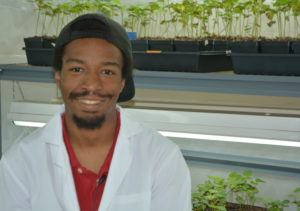How grade school science projects led to a career
Writer: Kathleen Phillips, 979-845-2872, [email protected]
Contact: Kevin Cox, 979-845-7311, [email protected]
COLLEGE STATION — Kevin Cox wanted to be a medical doctor from the time he was about five years old. He had a passion for helping people, and he especially wanted to help other kids.
So he got serious about science in grade school — so serious that he made really good grades on his science projects.
“I figured I could help children best by becoming a pediatrician so that was my career goal since second or third grade,” he recalled.
In college, Cox majored in biology, thinking it would land him a spot in medical school. The introductory biology class provided his first introduction to plants. He wasn’t from a farm and had never really thought about plants.

That experience proved life-changing. He landed a job as an undergraduate student working at the Donald Danforth Plant Science Center in St. Louis, Missouri, which further fueled his interest in plants.
Cox followed his instincts toward becoming a doctor of plants rather than people.
“Kevin has grasped every opportunity to excel in my laboratory and department,” said Dr. Libo Shan, associate professor of plant pathologist who oversees Cox’s graduate program at Texas A&M University in College Station. “He surprised me with his dedication and passion for the projects I asked him to try. He will have a bright future in academics.”
Cox still has more than a year to go in graduate school, but he’s already a lead author on a peer-reviewed journal article about a major discovery regarding bacterial blight in cotton.
“I’ve learned how to take lead in a project, how to communicate with my collaborators, how to draft the paper, how to organize the data and experimental techniques — everything you ask for in a doctoral program,” Cox said. “This project helped elevate my abilities and my skills.”
And, he said, it all still relates to his passion for helping others.
“The long-term goal is to become a university professor, teaching and running my own research lab at a university, studying plants and how they defend themselves against pathogens or even drought or any type of stress, because that all affects crop yields,” he said.
“And the crazy thing about it is I’m still helping kids, still helping adults. The world population is growing. As that happens, there is a bigger demand for food, which means prices are going to come up. Prices will go even higher if crops die. So if I can find a way to stop the crops from dying due to stresses, then I will be able to help people afford food at a lower price.”
Cox’s message to kids in science classes now is “go with your passion and let them guide you to your career, because if you follow your passion, nine times out of 10 it’s not going to steer you wrong. Mine led me to a slightly different career, but I still have a passion for science like I have had since I was a little kid.”


